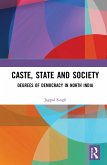This book is an enlightening, inspiring, and sobering account of the social and economic transformation of Poland. A multinational and interdisciplinary group of scholars examine the historical precursors that gave shape to the Solidarity movement, then focus on the institutional change that today presents challenges even more daunting than those of the earlier drama of resistance. The contributors have uncovered episodes of political domination, debt, and dependency that are not well known or well understood. These have important implications for economic development in general and for the reconstruction of the deindustrializing economies of Eastern Europe in particular. If Poland is to survive the crisis of the early 1990s, a new and authentic program of economic and human development must be adopted by West and East alike. The book concludes with a new discourse on development.
Hinweis: Dieser Artikel kann nur an eine deutsche Lieferadresse ausgeliefert werden.
Hinweis: Dieser Artikel kann nur an eine deutsche Lieferadresse ausgeliefert werden.








